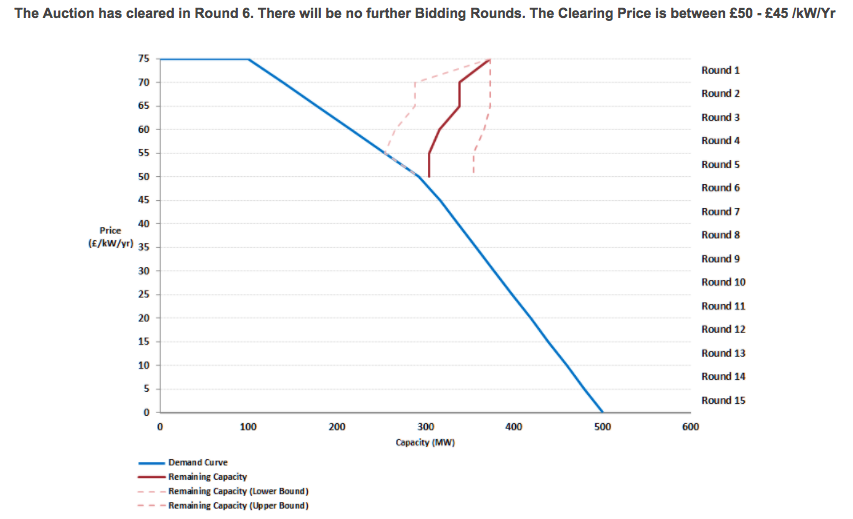 The capacity market auction specifically for turn down demand-side response has cleared between £45 and £50/kW, according to the EMR delivery body. The exact clearing price will be published at 7pm. Updated: Clearing price is £45/kW/yr.
The capacity market auction specifically for turn down demand-side response has cleared between £45 and £50/kW, according to the EMR delivery body. The exact clearing price will be published at 7pm. Updated: Clearing price is £45/kW/yr.
The result is around double that anticipated by some market participants, and much higher than last year’s Transitional Auction, which cleared at £27.50/kW. Smartest Energy, which was vying for around 100MW of contracts, suggested it would clear at around £25/kW.
National Grid aimed to procure around 300MW, but had leeway to procure up to 500MW if the price fell significantly. In the end it procured 312MW for delivery next winter, making the total value of the auction around £14m.
Given that only 373MW of turn down DSR was bidding for contracts, the high outturn is perhaps unsurprising. It does, however, provide an indication of the volume of turn down DSR in the market, which had previously been an unknown quantity. According to Energyst Media’s end user surveys, the vast majority of demand-side response comes from generation technologies.
Today’s auction was the last set aside purely for turn down DSR. The now defunct Energy and Climate Change Committee urged the government to create policy that favours turn down demand side response over decentralised diesel generation in its final report. Such an approach, via a mooted merit order, would be more environmentally friendly. But it would significantly reduce the current DSR market that is able to contribute to security of supply.
Regulator Ofgem has recently issued proposals that would make engine farms less competitive in the capacity market, but other market participants, such as Flexitricity founder Alastair Martin, believe there is a simpler fix for a market that has failed to deliver a single large scale new build combined cycle gas turbine.
Update: 19:00 22/03/17: headline updated to reflect actual clearing price.
Related stories:
Free demand-side response report
Smartest Energy: TA to clear at £25/kW, more support needed for DSR
Energy minister: TA capacity auction can procure up to 500MW
Capacity market ‘will continue to incentivise engine farms without simple fix’
National Grid buys 139MW of demand turn up to balance grid in summer
Capacity market clears at £6.95/kW
Grid procures 803MW of extra power in first transitional capacity auction
Scottish Power asks Ofgem to change classification of batteries in capacity market
Gateshead Council signs £1m demand response contract with Flexitricity
Capacity market too low for new gas but gigawatts of DSR, storage and CHP win contracts
Capacity breach: Public leisure facilities face closure due to energy policy costs
Firms ill prepared for ‘huge’ impact of capacity charge on bills
National Grid issues first capacity market notice
Energy suppliers step up DSR aggregation efforts
Flexitricity launches footroom service
Flexitricity warns demand response cannot be rushed as winter looms
National Grid mulls rolling all frequency balancing services into one scheme
Follow us at @EnergystMedia. For regular bulletins, sign up for the free newsletter.





There is nearly 10GW of untapped business led demand response, including highly efficient combined heat and power, ready to support the UK’s energy security. To achieve this potential however, user led demand response must be able to access all markets, from the Capacity Market and Balancing Mechanism to the Wholesale Market and ancillary services market, on an equal footing with traditional generation.
ADE Director Dr Tim Rotheray said:
“Today’s results are returning value to energy users for helping keep the lights on, while also cutting emissions through zero carbon demand response. Instead of paying power stations to increase supply, businesses will be managing demand in innovative ways while meeting all their energy needs leading to a more efficient, more affordable and lower carbon system.
“This auction is designed to help lower costs and improve uptake of demand response so that this tool will play a key part of the future energy sector. The Transitional Arrangements are vital in supporting this innovative sector to grow, deliver Britain’s security of supply needs and ultimately help drive a more competitive demand response market.”